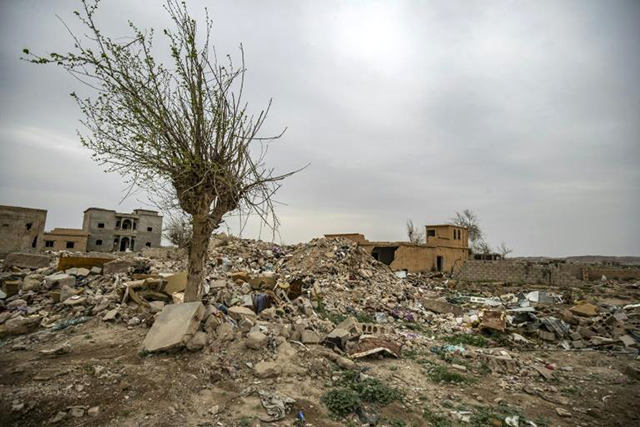HASAKEH, Syria — Years after jihadists stole her away to Syria, 17-year-old Layla Eido finally recontacted her family in Iraq several months ago. But a coronavirus lockdown has delayed their long-awaited reunion.
The teenager from Iraq's minority Yazidi community has been stuck in northeast Syria since the Daesh group's so-called "caliphate" collapsed last year, ending her captivity.
But just when she was on the cusp of reuniting with her family, the novel coronavirus pandemic forced both Iraq and Syria to close their borders, stalling her return.
"The coronavirus is keeping me from seeing my family," she told AFP inside a home where she is staying near the Syrian city of Hasakeh.
"I am counting the days until I see them again."
The soft-spoken girl is among dozens of Yazidi women and girls who were abducted by Daesh from their ancestral Iraqi home of Sinjar in 2014, then enslaved, systematically raped, or married off by force to terrorists.
Many remain missing, despite hopes they would be found after the Kurdish-led Syrian Democratic Forces and the US-led coalition declared the Daesh proto-state defeated in March last year.
Layla was forcibly taken from Sinjar aged just 11 years old, and later married off to a 21-year old Iraqi Daesh fighter from Tal Afar -- a man she said treated her like a "proper wife".
She lived alongside her husband in several of the group's Syria strongholds until he was killed last year in the village of Baghouz near the Iraqi border, where Daesh fighters made their last stand.
Laying low
Newly widowed, Layla found herself among the hundreds of thousands of people who flooded out of the former Daesh bastion, after months of bombardment.
They were taken to the Kurdish-run Al Hol camp, now home to thousands of Daesh wives and their children, including many who are still committed to the group's extremist beliefs.
Fearing for her safety, she kept the fact that she was a Yazidi a secret, telling only one person she had met in the destitute settlement -– a woman belonging to the same minority.
The jihadists "used to scare us and tell us the Kurds would kill us if we told them who we really were," said Layla, who later realised this was not true.
When her Yazidi friend from Al Hol returned to Iraqi Kurdistan last year with help from Kurdish authorities, she managed to track down Layla's family and helped them connect with their long-lost daughter via Facebook.
Layla says she received the first message from her parents five months ago, and now they exchange text messages on a daily basis.
"I speak to my family every day over WhatsApp and we exchange pictures and I get to check up on them," she said.
For around a month, Layla has been staying with a Syrian Yazidi family.
The family head, an official with the Yazidi House organisation, has been helping to organise her reunion with her parents and siblings, who are living in a displacement camp in Iraq's northern Dohuk province.
But it remains to be seen when this repatriation will happen.
"There is nothing we can do," said Ali Kheder, of the Yazidis' Higher Spiritual Council, the group's highest religious body.
"The borders are closed on both sides because of the virus."
"When they reopen, she will return."
'Different customs'
Inside a large bedroom, Layla holds a mobile phone, looking at pictures of other Yazidi women who have also been helped to return home.
Like many of them, she said she fears a difficult homecoming.
She no longer fully understands Kurdish, having spoken Turkmen with her husband and Arabic with her friends for years.
In captivity, she was called Zeinab, after the eldest daughter of the Prophet Mohammad, and was indoctrinated into Islam, although she said she has now returned to the Yazidi faith.
It was not until she left the Al Hol camp last month that she took off her niqab, a face veil she said she had grown used to.
"I am scared it will be difficult for me to adapt to my family since I left them when I was just little," she said.
"I was far away from them, I lived with strangers and practiced different customs."
But Layla says she is desperate to heal her wounds.
"I want to live a better life, without warplanes, without bombardment and war," she said.
"I want to go back to my family as soon as possible and start a new life."
